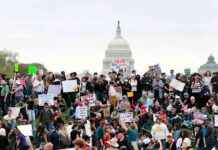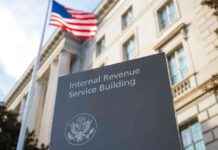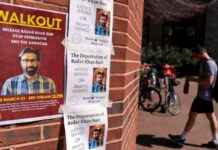Columbia Activist Mahmoud Khalil Speaks Out on ICE Abduction
In a recent op-ed published in the Columbia Spectator, Mahmoud Khalil, a Columbia University student activist, shed light on his experience of being arrested by immigration authorities on March 8. Khalil, known for leading pro-Palestinian rallies on campus, referred to his apprehension as an “abduction” and emphasized the escalating intimidation faced by international students who share his stance on Palestine. Despite being in custody in Louisiana as his case progresses through the courts, Khalil urged his fellow students to persist in their demonstrations and protests.
Challenging Deportation Efforts
Mahmoud Khalil, a lawful U.S. permanent resident with a green card, has been vocal about the alleged violation of his due process and First Amendment rights amidst the Trump administration’s efforts to deport him. While federal officials have accused him of leading activities aligned with Hamas, a designated terrorist organization, Khalil has not been charged with any criminal offense. His attorney has vehemently denied any involvement in supporting terrorist activities, emphasizing the lack of evidence to support such claims.
Supporting Student Dissent
Khalil’s op-ed also highlighted the plight of other students facing similar challenges, such as Tufts University doctoral student Rümeysa Öztürk, who has been accused of engaging in activities supporting Hamas. The Department of Homeland Security’s assertions regarding Öztürk’s involvement have been met with scrutiny, especially after a judge temporarily blocked her deportation. Khalil, drawing a parallel to his own experiences fleeing persecution in Syria, emphasized the importance of standing in solidarity with targeted students and advocating for their rights.
The student-led protests against Israel’s war in Gaza have sparked debates on campuses nationwide, drawing attention to issues of Palestinian rights and civilian casualties. However, these demonstrations have also faced criticism, with some labeling them as antisemitic. The broader implications of these protests have resonated beyond campus boundaries, leading to significant consequences for institutions like Columbia University.
Columbia University, under the leadership of President Nemat “Minouche” Shafik, faced considerable backlash over its response to student protests, culminating in the cancellation of federal funding by the Trump administration. Following Shafik’s resignation and subsequent negotiations to restore funding, the university agreed to a set of demands to address concerns raised by the administration.
In the face of these challenges, Khalil’s message to his fellow students remains one of resilience and unity. Encouraging them to continue their efforts to reclaim the university and carry forward the work of the past year, Khalil’s call to action underscores the importance of standing up for one’s beliefs in the face of adversity.
This article, originally featured on NBCNews.com, sheds light on the ongoing struggles faced by student activists like Mahmoud Khalil and Rümeysa Öztürk, highlighting the importance of defending free speech and advocating for justice in a complex and contentious political landscape.
































